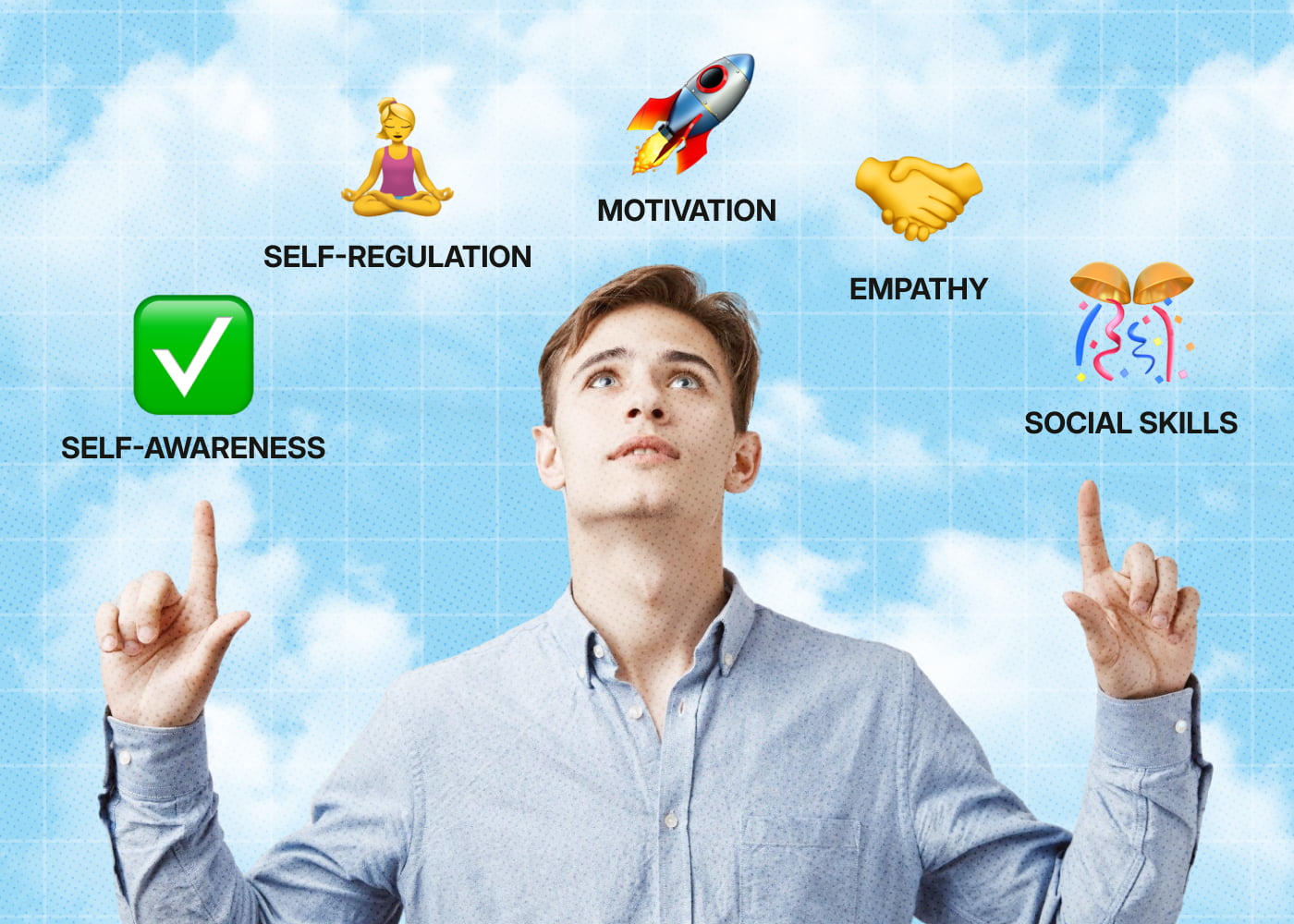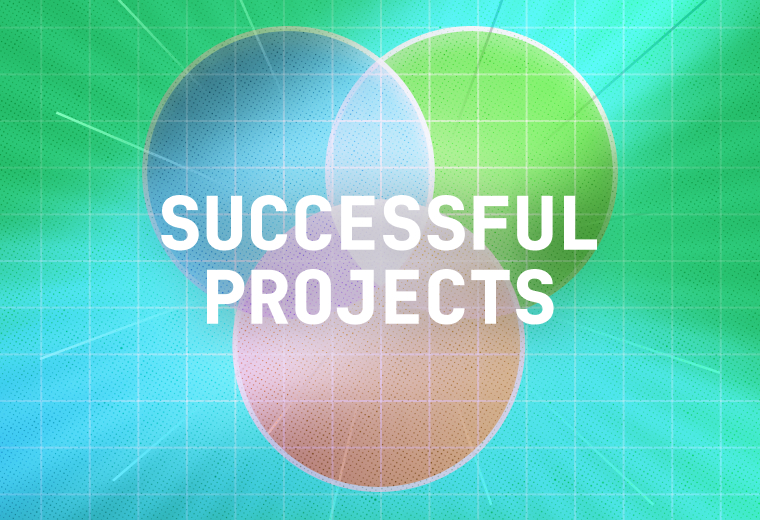As technologies advance and increasingly replace some human skills, one thing will always remain essential: soft skills. In fact, the demand for emotional skills is projected to grow by 26% by 2030. Meanwhile, emotional intelligence is among the top 10 most in-demand skills and will remain so through at least 2025. It has a tremendous impact on team communication, with the mental well-being of employees serving as the fuel that drives effectiveness and, consequently, progress. So, take the opportunity to discover what emotional intelligence is, how to develop it within your team, and how to become an emotionally intelligent manager.
What Is Emotional Intelligence?
Emotional intelligence, often abbreviated as EI or EQ (emotional quotient), refers to the capacity to identify, comprehend, and regulate emotions in oneself and others. The psychologists Peter Salovey and John D. Mayer first proposed this idea in 1990, and Daniel Goleman later made it prominent. Since then, it has proven crucial for developing leadership abilities and interpersonal skills.
A variety of skills that help people control their emotions and easily negotiate social complexity make up emotional intelligence. People with strong emotional intelligence are usually better at resolving conflicts, communicating, and upholding healthy relationships. These skills have a big impact on team dynamics, motivation, and productivity in project management and team environments.
How Important Is Emotional Intelligence in the Workplace?
Emotional intelligence is the cornerstone of fostering a supportive and cooperative work environment. It improves trust, facilitates communication, and helps teams overcome obstacles more successfully. The following explains the importance of EI in the workplace:
- Improved Team Collaboration. Emotional intelligence allows smoother connections among team members, encouraging a cooperative atmosphere. When teammates understand each other's emotions and perspectives, they can interact more effectively, leading to improved cooperation and teamwork.
- Enhanced Conflict Resolution. Although disagreements will inevitably arise at work, employees with high EI are better able to handle them peacefully. Team members and leaders can settle conflicts calmly and empathetically by acknowledging and addressing emotions.
- Boosted Morale and Engagement. Leaders with emotional intelligence create a positive work environment that recognizes and acknowledges the efforts of their staff. This support raises spirits, promotes involvement, and ultimately boosts productivity.
- Greater Resilience and Adaptability. Emotionally intelligent individuals are more resilient and capable of handling setbacks and stress. They can adapt to change with a positive outlook, an invaluable trait in fast-paced environments or during challenging project phases.
Note that emotional intelligence is important not only for making a harmonious workplace, but also for gaining higher productivity and overall organizational well-being.
What Are The Core Elements of Emotional Intelligence?

Emotional intelligence consists of five key elements, the skills that could be developed. Let’s take a look at all of them:
- Self-Awareness. Self-awareness is the king. It is the ability to recognize one's own emotions and comprehend how they influence behavior. Self-aware workers manage their emotions and determine their strengths and the areas that can be improved. It is not about criticizing yourself, but being honest and not taking things personally.
- Self-Regulation. This ability to control one's emotional impulses and respond to stressful situations calmly. Self-regulation is your “STOP” sign, essential for maintaining composure under stress.
- Motivation. This one thing in the EI skills list involves intrinsic drive, the pursuit of goals, and a passion for work beyond external rewards. Individuals with high motivation are more likely to stay engaged, overcome obstacles, and inspire others to achieve project goals.
- Empathy. This is the ability to comprehend and communicate the emotions of your own and others. In a team setting, empathetic individuals can anticipate and address the needs of others, making collaboration more effective and fostering a supportive team environment.
- Social Skills. By this, we mean effective communication, active listening, and the ability to build rapport with others. For managers, social skills are required for handling team dynamics and creating a favorable team culture.
How to Develop Emotional Intelligence for the Team
Ok, if developing social intelligence is an achievable goal for you personally, what should you do if you're in charge of others? Well, fostering emotional intelligence within a team is challenging but possible, with tips ranging from establishing a strong team morale to organizing regular events. Here are some strategies to build EI across a team:
- Foster Open Communication. Create a culture where team members feel comfortable expressing their thoughts and emotions. Encourage regular feedback sessions where team members can share their perspectives without fear of judgment.
- Promote Empathy and Active Listening. Organize training sessions focused on active listening and empathy-building exercises. Encourage team members to practice listening to each other and considering different viewpoints before responding.
- Set an Example of Emotional Intelligence. Team leaders should model emotional intelligence by demonstrating self-awareness, empathy, and effective communication. When leaders exhibit these behaviors, team members are more likely to follow suit.
- Encourage Self-Awareness Practices. Promote activities that enhance self-awareness, such as reflective journaling or mindfulness exercises. These practices help team members recognize their emotional triggers and responses.
- Conduct HR courses. Encourage taking courses on Emotional Intelligence using the internal HR system. This system allows employees to share psychological insights, participate in training sessions, and assess how well the team has learned and applied these skills.
- Organize Team-Building Exercises. Team-building activities help to foster trust, compassion, and knowledge among the team. These activities can range from problem-solving challenges to informal group conversations, strengthening EI within the team.
- Automate time tracking. A time tracker helps identify inefficiencies and prioritize improvements, leading to a more streamlined and effective workflow. You can expand this method across the team by noting which tasks take the longest and exploring if adding collaboration could streamline the process. Analyze the task types that consistently require more time, then leverage this data to refine and improve scheduling in the future.
Team culture is created through daily efforts, but this work is incredibly valuable—it shapes your corporate atmosphere and promotes success. By fostering a team culture that values emotional intelligence, project managers can help their teams become more cohesive, resilient, and adaptable in the face of challenges.
How to Develop Emotional Intelligence as a Manager

The manager is the one who shows the example. So, there could be done some steps to promote the development of emotional intelligence. Here’s how managers can work on developing their EI:
- Cultivate Self-Awareness. Project managers should regularly reflect on their emotional responses, especially in challenging situations. Practicing self-reflection can help them identify emotional triggers and learn to manage them effectively.
- Work on Empathy. Managers can practice empathy by taking the time to understand their team members' concerns, challenges, and motivations. Empathetic managers are more likely to build trust and foster loyalty within the team.
- Focus on Effective Communication. Clear and open communication is essential for any manager. Emotionally intelligent managers practice active listening, express themselves clearly, and address issues openly without letting emotions interfere.
- Demonstrate Resilience and Optimism. Managers who model resilience and maintain a positive outlook can inspire their teams to adopt similar attitudes. This ability to adapt and stay positive can be particularly motivating during difficult project phases or unforeseen setbacks.
Spend time to invest in developing emotional intelligence and you will set a positive example for the teams and promote a collaborative work environment.
Final Note
Emotional intelligence is an essential factor to consider when forming and working within a team, as it directly impacts the team’s effectiveness and organization. While hard skills can be developed through training and experience, emotional intelligence is much more challenging to cultivate. Maintaining awareness of team members' emotional intelligence and mental well-being can create a thriving work environment primed for new achievements.



